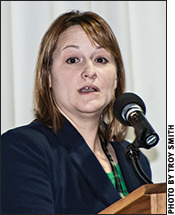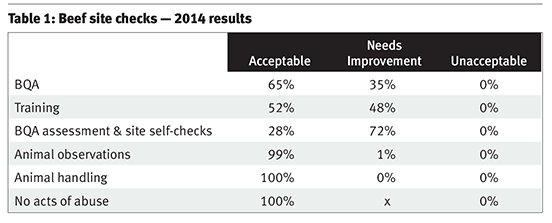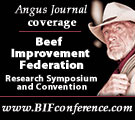FarmCheck™ for Consumers
Tyson FarmCheck program gives consumers peace of mind on animal welfare.
Cattlemen have a stake in animal welfare, no pun intended. Consumers also have a stake, but they have less experience and knowledge of production methods. This lack of experience garners questions about animal welfare. Lora Wright, beef supply chain manager for Tyson Foods, explained how Tyson is providing animal welfare verification for its supply chain to answer consumer questions.

Lora Wright, beef supply chain manager for Tyson Foods, explained how Tyson is providing animal welfare verification for its supply chain to answer consumer questions.
Wright spoke to attendees of the Range Beef Cow Symposium XXIV (RBCS) in November.
Google provides plenty of ways to find information about animal welfare, but there is plenty of misinformation available, too, she observed. There are several certification programs that producers can join to ease consumers’ concerns. Examples include the Global Animal Partnership (GAP) and Certified Humane (also known as Humane Farm Animal Care), which have similar requirements, such as written management plans; age requirements for castration, dehorning and branding; no animal byproducts fed, ionophores or growth promotants; and third-party verification.
Industry programs like Beef Quality Assurance (BQA) and company-based programs can create their own standards, but Wright said consumers are hesitant to trust those because they are voluntary and not third-party-verified. Thus, Tyson started FarmCheck™, a program with a protocol involving site checks and evaluation, in 2012. Starting with the pork industry, Tyson added beef and poultry to the program in 2013.
The FarmCheck program has four guiding principles:
- A committed staff. It has a committed internal staff to give the animal welfare checks their full attention.
- Advisory panel. There is an advisory panel to reach out to the industry for insight.
- Research program. Research helps find better ways to do things.
- Site checks. These site checks show that Tyson cares enough to check farms in person.
Wright explained that standard elements of site checks include training in animal handling, site self-checks, daily observation, animal and facility observations, handling practices, euthanasia, and no acts of abuse.
For the beef industry, these site checks are on Tyson’s direct suppliers, which included feedlots, livestock markets and specialty program suppliers. The challenge is that there are many types of cattle operations. However, no matter the facility, the focus of the program is on human-animal interaction.

Upon evaluation, supplier programs are rated as acceptable, needs improvement or unacceptable. If an operation gets a “needs improvement” on any aspect, the FarmCheck evaluator explains what didn’t meet expectations, and the operation has time to improve it before a recheck.
The beef industry has a great story to tell. In 2014, Wright said acceptable rates were 99% for animal observations, 100% for handling, 100% for no acts of abuse, 65% for BQA-certified, 52% on training, and 28% for BQA assessment and site self-checks. In those lower percentages, those producers were amenable to making changes.
Wright concluded with these key points: FarmCheck is not a certification program, and it was not designed to tell producers how to raise their animals. It also isn’t intended to eliminate suppliers. It does send a positive message, and it gives the supply chain a third-party audit to enhance credibility to consumers.

Editor’s Note: This summary is part of the Angus Journal’s online coverage of the 2015 Range Beef Cow Symposium, which was hosted Nov. 17-19, 2015, in Loveland, Colo. For additional coverage or to listen to this presentation, visit the Newsroom at www.rangebeefcow.com. The Angus Journal’s coverage of the event is made possible through collaboration with the event committee and sponsorship of LiveAuctions.tv.






